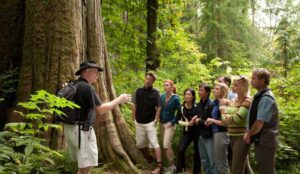In an era where preserving the planet’s natural beauty and cultural heritage is paramount, sustainable tourism has emerged as a beacon of hope for conscientious travelers. This eco-conscious approach to travel seeks to minimize negative impacts on the environment, support local communities, and foster cultural preservation, all while offering enriching experiences for visitors.
The beauty of our planet is both precious and fragile, the concept of sustainable tourism has emerged as a guiding principle for travelers seeking to explore the globe with mindfulness and care. Sustainable tourism goes beyond mere sightseeing; it encompasses a commitment to preserving the environment, supporting local communities, and fostering cultural appreciation.
Check more updates here: https://www.youtube.com/watch?v=S3U6CjrlZxQ
Preserving Natural Wonders
At the heart of sustainable tourism lies a commitment to preserving the planet’s natural wonders and biodiversity. From pristine coral reefs to lush rainforests and endangered wildlife habitats, responsible travelers prioritize destinations and activities that minimize ecological footprint and contribute to conservation efforts. This may include supporting eco-friendly accommodations, participating in wildlife conservation projects, and choosing low-impact outdoor activities such as hiking and birdwatching.
Travelers are encouraged to seek out destinations and activities that minimize their ecological footprint and contribute to conservation efforts. Whether it’s exploring pristine national parks, snorkeling in coral reefs, or hiking through ancient forests, responsible travelers prioritize experiences that allow them to connect with nature while minimizing their impact on delicate ecosystems.

Community Engagement and Empowerment
Sustainable tourism goes beyond environmental conservation; it also prioritizes the well-being and empowerment of local communities. By engaging with indigenous cultures, supporting locally-owned businesses, and participating in community-based tourism initiatives, travelers can contribute to economic development and cultural preservation. This may involve staying in community-run homestays, shopping at artisan cooperatives, and participating in cultural exchange programs that promote mutual respect and understanding.
By staying in locally-owned accommodations, dining at family-run restaurants, and purchasing souvenirs from artisan cooperatives, travelers can directly support the livelihoods of residents and contribute to economic development. Additionally, engaging with indigenous cultures through guided tours, cultural exchanges, and homestay experiences fosters mutual respect and understanding, enriching both travelers and host communities.

Embracing Responsible Travel Practices
From reducing waste to conserving resources, responsible travel practices are essential components of sustainable tourism. Travelers can minimize their environmental impact by choosing eco-friendly transportation options, such as walking, cycling, or using public transit, and by packing light and using reusable products.
Opting for accommodations with green certifications and participating in carbon offset programs further reduce the carbon footprint of travel, ensuring that journeys are as sustainable as they are memorable.
Travelers can minimize their environmental impact by opting for eco-friendly transportation options, such as cycling, walking, or using public transit, and by packing light and using reusable products. Additionally, choosing accommodations with green certifications and participating in carbon offset programs can help mitigate the environmental footprint of travel.
Cultivating Awareness and Appreciation
Sustainable tourism is also about education and awareness. Through guided tours, educational programs, and interactive experiences, travelers can learn about the importance of conservation, cultural heritage, and responsible travel practices. This deeper understanding not only enriches the travel experience but also empowers travelers to become advocates for sustainable tourism within their communities, spreading awareness and inspiring others to make positive choices.

Collaboration and Advocacy
Ultimately, sustainable tourism requires collaboration among travelers, businesses, governments, and communities. By advocating for sustainable tourism policies and supporting initiatives that promote responsible travel, travelers can become agents of change and contribute to building a more sustainable future for all.
Whether it’s participating in volunteer projects, supporting conservation organizations, or advocating for sustainable tourism practices, every action makes a difference in preserving our planet’s precious resources and cultural heritage for generations to come.
Sustainable tourism offers a pathway to exploring the world with a conscience, mindfulness, compassion, and respect where every journey leaves a positive impact on the planet and its people.
By embracing conservation, community engagement, responsible travel practices, education, and advocacy, travelers can embark on meaningful journeys that not only enrich their lives but also contribute to the preservation of our planet’s precious resources and cultural heritage.
Let’s tread lightly, travel responsibly, and leave a legacy of sustainability for future generations to enjoy.
Read More: https://placesandlifestyle.com/how-to-efficiently-book-travel-tickets/




